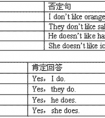根据句意,用括号内所给词的适当形式填空。1. My mother goes to Beijing __________(two) a year. 2. Can you find the __________(different) between this box and th-八年级英语
youths(男青年、小伙子), relations(亲属), beauties(美人),necessities(必需品)等。例如:
Twenty youths attended the meeting yesterday.二十个男青年出席了昨天的会议。
All his poor relations came to spend their holidays at his home.他所有的穷亲戚都在他家过节。
考点名称:可数名词(单数名词,复数名词)
- 可数名词:
是指能以数目来计算,可以分成个体的人或东西;
因此它有复数形式,当它的复数形式在句子中作主语时,句子的谓语也应用复数形式。 - 名词单数变复数的规则:
巧记以f\fe结尾的可数名词复数情况 构成方法 例词 读音 一般情况 在词尾加-s desk→desks
map→maps-s在清辅音后发/s/ day→days
girl→girls-s在元音和浊辅音后发/z/ 以s,x,ch,sh结尾的词 在词尾加-es bus→buses box→boxes watch→watches fish→fishes -es发/iz/音 以辅音字母加-y结尾的词 变y为i再加-es family→families
factory→factories
party→patries-ies发/iz/音 以元音字母加-y结尾的词 在词尾加-s day→days
boy→boys
key→keys-s发/z/音 以f或fe结尾的词 变f或fe为v再加-es knife→knives
life→lives
wife→wives
half→halves-ves发/vz/音 以辅音字母加-o结尾的词 在词尾加-es potato→potatoes
tomato→tomatoes
hero→heroes-es发/z/音 以元音字母加-o结尾的词 在词尾加-s radio→radios
zoo→zoos-s发/z/音
妻子骑牛拿起刀,wife,calf,knife ↑
追得贼狼满街跑,thief,wolf →→→变f或fe为v,再加es
碰倒架子丧己命,shelf,self,life ↓
手帕树叶半空飘。handkerchief,leaf,half ↓ - 名词复数的不规则变化:
1.不规则形式:
child→children(儿童)
man→men(男人)
woman→women (女人)
an Englishman→two Englishmen(英国人)
foot→feet(脚)
tooth→teeth(牙)
mouse→mice(老鼠)
ox →oxen(公牛)
goose→geese(鹅)
2.单复同形:
deer,sheep,fish,Chinese,Japanese, species,means,Swiss
除人民币,美元、英镑、法郎等都有复数形式。
如:a dollar,two dollars; a meter,twometers
3.集体名词,以单数形式出现,但实为复数:
people police cattle是复数
(OK :a person,a policeman,ahead of cattle,the English,the British,the French,the Chinese,the Japanese,the Swiss )
(Error:a people,a police,a cattle )
表示国民总称时,作复数用。
(The Chinese are industries and brave. 中国人民是勤劳勇敢的。)
4.以s结尾,仍为单数的名词
maths,politics,physics等学科名词,为不可数名词,是单数。
news是不可数名词。
5.表示由两部分构成的东西,
glasses(眼镜) trousers (长裤) clothes(衣服)
若表达具体数目,要借助数量词pair(对,双)a pair of glasses two pairs of trousers suit(套)
6.另外还有一些名词,其复数形式有时可表示特别意思
goods (货物) waters (水域) fishes (各种鱼) - 可数名词变复数的几种形式:
1) 单数名词加s: students, apples, bags, trees, books, brothers.
2) 以s、x、sh、ch结尾的名词加es: glasses, boxes, brushes, matches.
3) 以辅音字母加y结尾的名词,变y为i加es: cities, babies, enemies.
4) 以f或fe结尾的名词,多数变f为v加es: wives, knives.但有些词只加s: roofs,proofs, chiefs.
5) 以o结尾的名词,有些加es: Negroes, heroes, tomatoes, potatoes. 其它加s: radio s, zoos, pianos, photos.
6) 不规则名词:foot→feet, goose→geese, tooth→teeth, child→children, man→men, woman→women, mouse→mice.
7) 单复数同形的名词:sheep,fish,dee.
注意:fish表示种类时,也用fishes这样的形式。
考点名称:频度副词
频度副词:
是表示动作发生频率的词。
常见的有:
ever, never, rarely, seldom, once, often, occasionally, constantly, frequently, usually,continually, always 等。
例如:He often came to see us.
She always was late.
常见频度副词在表示程度上有别,按频率大小排列如下:
always(100%)>usually(80%)>often(60%)>sometimes(40%)>seldom(20%)>hardly (10%)>never(0%)- 常见程度副词用法列举:
◆always 频率最高,表示动作重复、状态继续,表示“一直、总是”,其反义词为never。always等与not连用时,表示部分否定。如:
The rich are not always happy. 有钱的人并不总是快乐的。
如果要变为否定句,应将always改为never才能全部否定。如:
Li Ping is always late for school. 李平上学总是迟到。
Li Ping is never late for school. 李平上学从不迟到。(全部否定)
Li Ping is not always late for school. 李平上学不总是迟到。(部分否定)
频度副词通常和一般现在时连用,表示动作发生的频率。但always与进行时连用时,并不强调动作正在进行,而是表示赞叹、厌烦等情绪。如:
He is always thinking of others. 他总是想着别人。(赞叹)
She is always asking silly questions. 她总是问些愚蠢的问题。(厌烦)
The boy is always asking for money. 这个小男孩总是要钱。(厌烦)
◆usually意为“通常”,表示习惯性动作或状态,很少有例外。如:
We usually go to school at seven in the morning. 我们通常在早上七点上学。
My mother and I usually go shopping on Sundays. 我和妈妈通常在星期天去买东西。
◆Often意为“经常,时常”,表示反复性的动作或状态,中间有间断,不如usually那么频繁。其反义词是seldom。often在句尾时常被very或quite修饰。如:
It often rains here in April. 这儿四月份常下雨。
he boys often eat noodles and the girls sometimes eat them. 男生经常吃面条,女生有时吃。
I often chat with my friends under the big tree. 我经常在这棵大树下和朋友聊天。
He writes to his friends quite often. 他常给他的朋友写信。
◆sometimes意为“有时”,频率不及often,表示动作偶尔发生,间断时间较长。其位置比较灵活,放在句首、句中、句末都可。如:
Sometimes we go to the cinema and at other times we go for a walk.
有时我们去看电影,有时我们去散步。
I sometimes watch TV in the evening. 我有时晚上看电视。
My father has lunch in the factory sometimes. 我父亲有时在工厂吃午饭。
◆seldom意为“很少”;never意为“从不”。这两个副词表示否定意义,动作几乎不会发生。如:
He seldom eats breakfast. 他很少吃早餐。
The little girl seldom goes out. 这个小女孩很少外出。
I will never forget your kindness. 我永远忘不了你的好意。
The boys never eat chocolate and the girls seldom eat it. 男生从不吃巧克力,女生很少吃。
Btter late than never. [谚语] 迟到(迟做)总比不来(不做)好。
◆hardly具有否定意义,表示“几乎不、简直不”,除非特殊情况,否则不会发生。如:
The boy is so young that he could hardly understand it. 这个孩子太小了,不可能懂得这件事。
◆对上述频度副词提问时,用how often。如:
I write to my brother sometimes.
→How often do you write to your brother? 频度副词在句中不同位置的用法比较:
一、频度副词在否定句中的用法
在否定句中,有的频度副词位于否定词之前或之后均可,而有的频度副词则必须位于否定词之后,而还有的频度副词却必须要位于否定词。
大致情况如下:
- 最新内容
- 相关内容
- 网友推荐
- 图文推荐
上一篇:句型转换。1. I need one apple. (改为一般疑问句)______ you ______ one apple? 2. They need yogurt. (改为否定句)They ______ ______ yogurt. 3. Drink the smoot-八年级英语
下一篇:There _____ in this room. [ ]a. are too much furniture b. is too many furnitures c. are too much furnitures d. is too much furniture -九年级英语
零零教育社区:论坛热帖子
| [家长教育] 孩子为什么会和父母感情疏离? (2019-07-14) |
| [教师分享] 给远方姐姐的一封信 (2018-11-07) |
| [教师分享] 伸缩门 (2018-11-07) |
| [教师分享] 回家乡 (2018-11-07) |
| [教师分享] 是风味也是人间 (2018-11-07) |
| [教师分享] 一句格言的启示 (2018-11-07) |
| [教师分享] 无规矩不成方圆 (2018-11-07) |
| [教师分享] 第十届全国教育名家论坛有感(二) (2018-11-07) |
| [教师分享] 贪玩的小狗 (2018-11-07) |
| [教师分享] 未命名文章 (2018-11-07) |



![He showed ______ in English last year. And he is ______ in English. [ ]A. interest, much interested B. interest, more interested C. interesting, much intere-九年级英语](http://www.00-edu.com/d/file/ks/4/2/bukeshumingci/2019-11-20/smalld20f93968df0b44b42c9ed33f1601c891574264013.jpg)

![—What would you like?— ______, please.[ ]A. Two bottle of water B. Two bottle of watersC. Two bottles of watersD. Two bottles of water-七年级英语](http://www.00-edu.com/d/file/ks/4/2/bukeshumingci/2019-11-20/smalle0cc3bee894611c3e5f894077c6e0d4b1574264462.gif)
